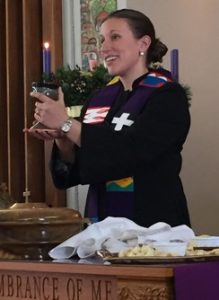Pastors are accustomed to being there for grieving people. It’s what it means to be a pastor.
But when it comes to suffering loss in their own circles, their pastoral training, experience and intuition can simply evaporate, say ministers who have been through it.
“You’re never prepared, no matter what seminary might tell you or what you learned in CPE (clinical pastoral education),” said Mary Apicella, pastor of Providence Baptist Church in Hendersonville, North Carolina.

Mary Apicella
Amy Grizzle Kane said the grief process was baffling when it was her turn to process it.
“It leaves you barren and everything changes,” said Grizzle Kane, associate pastor for missions and community at First Baptist Church in Greensboro, North Carolina. “Everything is rewritten and you have to figure it out.”
Both ministers have been open about the way grief impacted them as individuals and ministers, and they urge fellow clergy to seek avenues of healing even as they continue to serve congregations.
It’s an issue that overlaps with the often-publicized need for pastoral self-care to avoid clergy burnout. But the grief component adds especially deep, sometimes confusing layers of pain exacerbated by recurring emotions such as anger and depression.
‘Care for the soul’
It’s a reminder that self-care, whether or not in the realm of grief, is about relying on others for help, said Greg DeLoach, a veteran Baptist pastor and interim dean at Mercer University’s McAfee School of Theology in Atlanta.
When helping others grieve, he said, pastors are able to compartmentalize and work from their psychological and pastoral skill sets. But it doesn’t work in reverse.

Greg DeLoach
“Just as a physician has to have a physician to do care-giving on their own body, so a minister has to have ministers surrounding them with care for the soul,” he said.
That’s a lesson that doesn’t often come quick or easy.
“It shook the foundation of my being and frankly of my faith,” said Grizzle Kane, whose sister, Audrey, died in July from brain cancer.
When Audrey received her diagnosis seven months before, Grizzle Kane said she knew what to do.
“I went into crisis and caretaker mode and, as a minister, that’s where I was comfortable dwelling,” she said. “It was a coping mechanism and in my wheelhouse.”
But since her sister’s passing she’s been groping her way through the daily requirements of family and ministry life.
“It doesn’t always work well because you’re in the middle of an emotional fog,” she said.

Amy Grizzle Kane
Grizzle Kane was initially surprised she’s had so much difficulty applying her professional skills to her own situation.
“I have been in morgues and held the hands of people as they died,” she said.
When it’s your own family, however, none of that comes into play.
“I was equipped to function in the midst of crisis and to be a non-anxious presence, but nothing prepares you or equips you for the grief over someone who is dear to you,” she said. “This is a magnitude like none I have ever known.”
‘Grief needs time’
For Apicella, it was the death of a beloved church member – one she had leaned on heavily as a mentor and friend – that upended her world in February 2018.
But Apicella had to channel her grief while leading a grieving congregation through the loss of someone they, too, held dear.
One of the biggest challenges was to keep it together the very next day while calling church members about the loss, she said.
“It felt like I was breaking the news of a family member’s death to family members,” she said. “It was one of the hardest things I have ever had to do.”
And it got harder.
“Making those calls the next morning and then leading worship on Sunday was really difficult.”
While Apicella said she did not try to mask her pain, she also knew she could not come undone in front of her flock.
“You have to manage it safely and professionally,” she said. “They need to look to their pastor to make some sense of it.”
But she also knew her grief needed to be processed, somehow.
What she did was turn to sources of strength outside her congregation.

(Photo/x1klima/Creative Commons)
“A pastor has to have a space to be in grief,” she said. “That’s really important.”
So she started leaning on friends in Baptist life, both lay and clergy. Eventually she joined a spiritual direction group of other women who meet monthly on issues of discernment.
She also connected with mentors and other pastors in the area.
Both groups have been integral in helping her through the loss.
“These are sacred blocks of time on my calendar,” she said.
By seeing to her own grief in those and other ways, Apicella said, she has become more sensitive to the suffering of her own church.
“You have to be sensitive to the ways people grieve, which takes having to grieve yourself,” she said.
Grizzle Kane said she, too, had to rely on others to process her suffering.
Her efforts at self-care included reaching out to a counselor and other ministers for support and embarking on days of silence and reflection at a Catholic retreat center.
She found that being patient with herself was extremely important.
“I found that grief needs time and space to be experienced and navigated,” Grizzle Kane said.
One of the many lessons from it all, she added, is the need for ministers to be proactive and creative addressing their own grief.
“Walking this path has made me a better pastor because it makes me better able to walk that journey with others,” she said.
